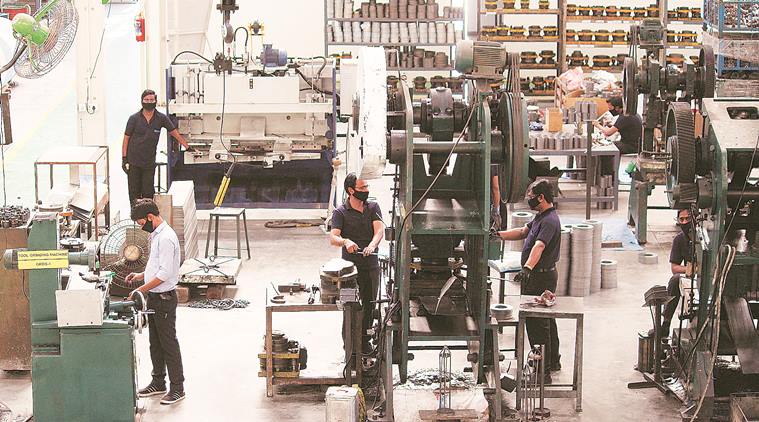 Libra is among the few units that has reopened at the Sanand GIDC. (Photo: Javed Raja)
Libra is among the few units that has reopened at the Sanand GIDC. (Photo: Javed Raja)
Libra Stampings LLP
No. of workers: 50
Usual strength: Around 50
As a car pulls into the parking lot of MSME Libra Stampings LLP in Gujarat’s automobile hub of Sanand, near Ahmedabad, Yatish Kumar Pandey, who has been trimming shrubs, rushes into the guard room, slips on a backpack containing a disinfectant, and hurries back out to sanitise the handles of the vehicle.
Known to all at the small factory as “Pandeyji”, the 45-year-old from Chitrakoot in Uttar Pradesh explains, “The car handle is the one place most owners should be wary of.”
Among the neighbours of Libra — which manufactures ‘stampings’, or parts used in submersible pumps, supplying them across the state — are Tata Motors and Ford Motors. However, since relaxations in the lockdown starting April 22, Libra is among the few units that has reopened at the Sanand GIDC (Gujarat Industrial Development Corporation).
The bustling hub stands quiet, with most units marked by locks on their front gates or lonely watchmen. The handcarts and kiosks selling tea and food are missing.
Libra’s 50-odd labourers, now split into two shifts of 25 each, are sharing duties. Pandey, for example, is a gardener, earning Rs 10,000 a month. For the reopening, the company gave him “training” on disinfecting people coming into the premises. He checks them with a thermal scanner, asks them to use a hand sanitiser, and sanitises their vehicles with the disinfectant spray in his backpack. No one apart from staff and government officials are allowed in.
Should the gun show red when someone is checked, Pandey is expected to alert the bosses.
The staff have been given masks to wear at all times, as they spread out over the vast shop floor of over 22,000 sq ft.
Naresh Vidhani, who owns Libra with elder brother Kanhaiya, says they have been able to restart as they managed to convince all their labourers to stay back when the lockdown began in March. “We have housed them, we pay them regularly and we have kept our unit canteen open,” he adds.
Ashwini Kumar, Secretary to Chief Minister Vijay Rupani, said around 40,000 industrial units with five lakh workers have reopened in Gujarat. “This is an important step towards normalisation. Things will slowly fall into place,” he said.
However, the Sanand Industrial Association said that while almost all units can now restart operations, many are hesitant due to the lack of markets and workers.
Naresh says they too are not sure about sales. “We are currently packaging the materials gathering dust for one-and-a-half months, keeping them ready for despatch whenever our clients ask for them. Our production is minimal as most of our clients are yet to start operations,” he says. Their monthly average is 125-150 tonnes of stampings, but the Vidhanis have not set any targets for the coming months.
Talking about the efforts to keep back workers, Naresh says, “I cajoled them, told them we would provide food and shelter and they were much safer on the campus than outside.”
With no food stalls open, the labourers are dependent on the kitchen set up at the back of the unit, run by Uday Singh and two helpers, who are from Rajasthan. They make rice, dal, pooris, sabzi and butter-milk for lunch and dinner, with the vegetable the only variant on the menu, apart from breakfast. The vegetables and milk are supplied daily by a local vendor.
At their living quarters on the first floor of the unit, the 25-odd not on duty that day lie on bunker beds across two large rooms with fans whirring against the summer heat. Their shoes lie strewn across the corridor, while clothes hang from multiple strings. There are 10 toilets, an equal number of bathrooms and a space to wash clothes.
The workers are not allowed to leave the premises. Only five staff members, including the Vidhani brothers, have transit permits.
Basant Yadav, who hails from Chapra in Bihar, says he last went home six months ago. “My mother and wife are back there. Now, there is danger that I might get infected on the way and end up transferring coronavirus to them. So the best option for me is to be at the factory and wait till the disease subsides,” he says.
Suraj Kumar, however, won’t wait a day longer once they are allowed to go. “When the trains begin, I plan to return,” says the 30-year-old.
Naresh is apprehensive he may not be able to hold on to them a second time. “We manufacture only one part of the motor. Till the time the other players open, we have to go slow or just wait. We do not expect the situation to normalise before four-six months,” he says.